Cancelled contracts upset Chinese drugmakers' overseas push
China's innovative drug developers are increasingly partnering with foreign companies to pitch their products overseas due to tighter profit margins in the domestic market. But this route, while lucrative, can also be precarious.
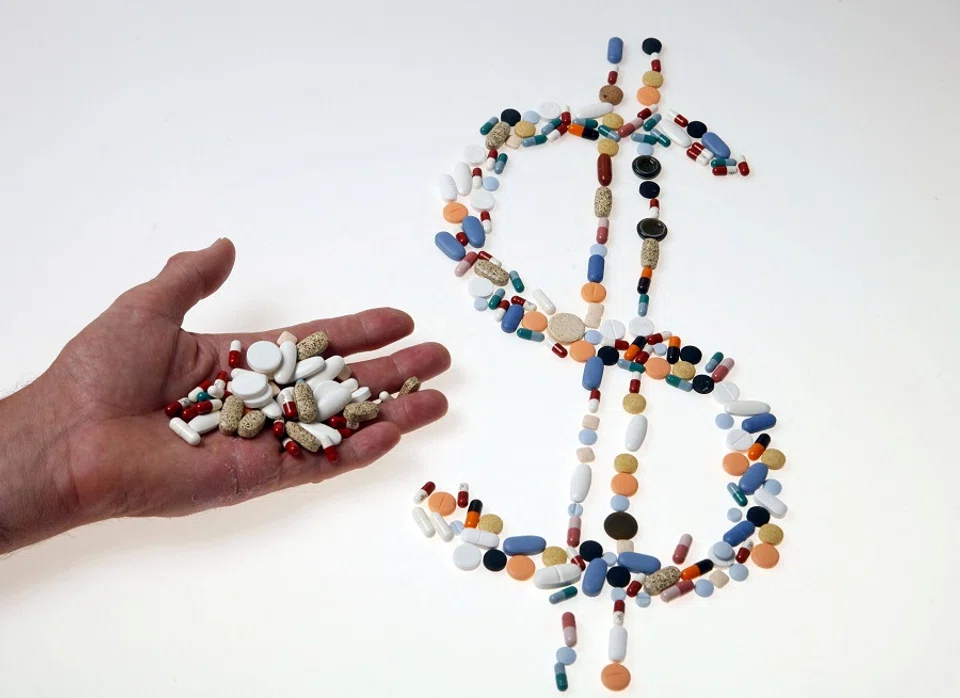
(By Caixin journalists Hua Ang and Wang Xintong)
With ever tighter profit margins in the domestic market, China's innovative drug developers are increasingly partnering with foreign companies to pitch their products overseas. But while this route of "out-licensing" drugs is lucrative, it can also be precarious, with multiple contracts terminated this year alone.
In the first half of this year, more than 20 Chinese pharmaceutical firms granted foreign partners the rights to commercialise novel drugs - including treatments already approved for use and still in development - in out-licensing deals worth a total of about US$12 billion.
"Chinese companies are taking in a lot more cash this year from out-licensing than they are spending from licensing products into the local market," said US investment bank Stifel Financial Corp. in a market review.
The review also showed that the China's pharmaceutical firms booked almost 35 times more funds from cross-border out-licensing deals than what was spent on in-licensing in the first half, compared with nearly three times for the whole of 2022.
The stronger performance indicates China's innovative drug industry is significantly strengthening, Liu Dan, a senior partner at Beijing-based CDH Investments, told Caixin.
But at the same time, some Chinese drug companies, such as Jacobio Pharmaceuticals Group Co. Ltd., BeiGene Ltd. and Innovent Biologics Inc., have had collaborations terminated by foreign buyers of their product rights in recent months.
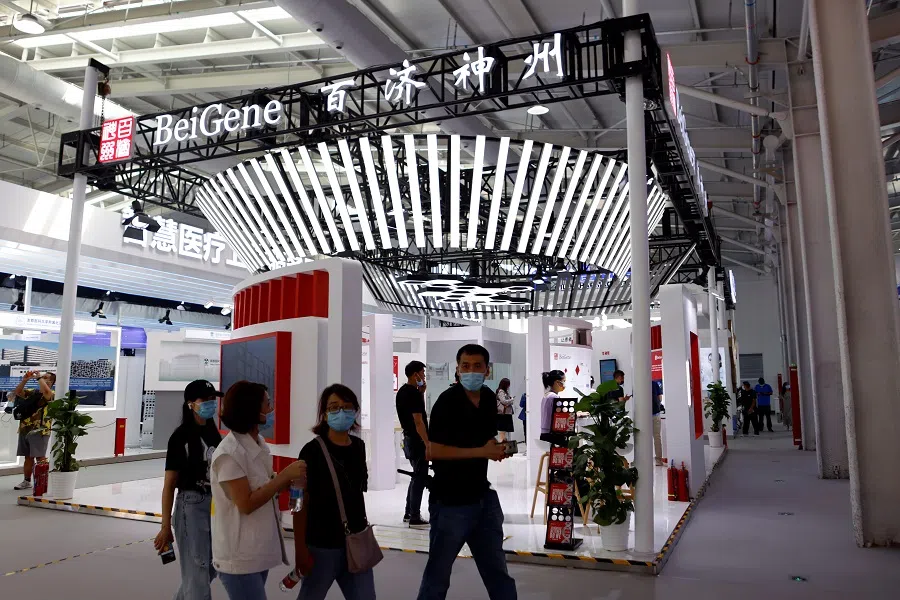
These are just some of the cases in recent years in which out-licensing agreements between Chinese drug developers and foreign partners have been terminated. And with limited disclosure about the reasons why agreements are ended, speculation is rife.
But while terminations are a blow to China's drugmakers, especially smaller firms pushing just one or two products, out-licensing is still their best bet for accessing profitable overseas markets.
Overseas expansion
Pharmaceutical out-licensing gives the licensee some or all of the rights to a treatment of the licensor, including the right to develop, promote and sell.
In China, access to the national health insurance catalog is the main way for drugmakers to enter the domestic market, but the government's strict price restrictions have significantly squeezed drug profit margins. This has forced innovative drug companies to speed up the pace of going overseas, with dual listings in China and the US increasingly standard practice for Chinese firms developing innovative projects, a healthcare investor said.
Whether it is a biotech startup or a traditional pharmaceutical company in the transition to innovation, it has to pave the way for its product to go overseas as soon as possible, the investor said.
But with more out-licensing deals comes more cases of "returns" - when a partner ends a collaboration, giving back the rights to a drug.
According to data tracker DXY Insight, the number of out-license deals involving rights to domestic innovative drugs increased rapidly from 2018, booming in 2020 with 41 transactions worth a combined US$6.8 billion, nearly ten times that of the previous year. In 2022, there were 37 such deals, worth a total of US$23.7 billion.
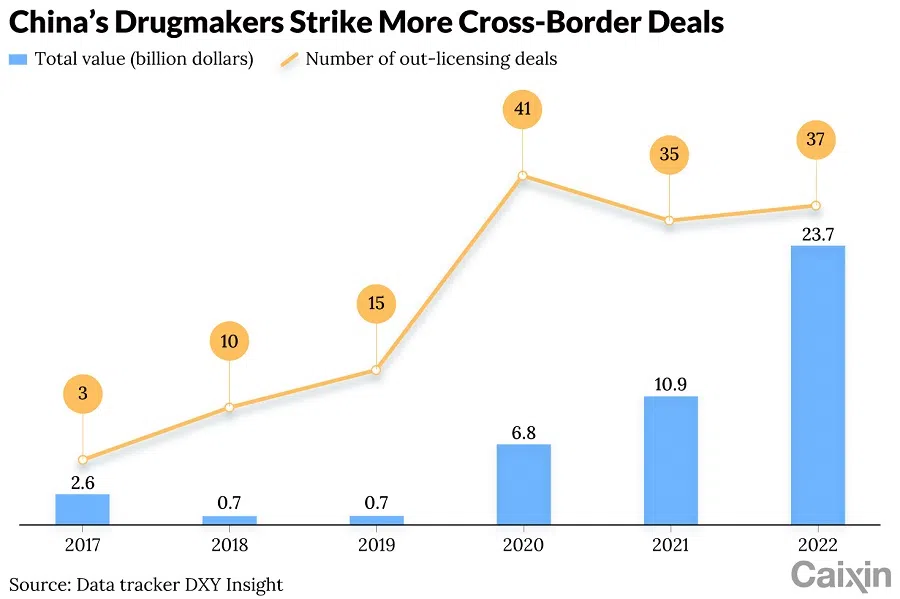
In the first half of this year, the number of China's outbound deals involving pharmaceutical rights exceeded the number of inbound deals for the first time, according to the Stifel review.
But with more out-licensing deals comes more cases of "returns" - when a partner ends a collaboration, giving back the rights to a drug.
"Pharmaceutical rights and interests transactions are essentially a sale, and 'returning' is a relatively normal business matter," said a person in charge of an innovative pharmaceutical company in China. In his view, the number of cross-border grants of innovative drugs in China was not large before, and the market has little understanding of the logic behind returns. "In the future, when there are more cross-border deals, 'returns' will naturally increase."
Terminating agreements
However, the increasing number of terminated agreements has some investors re-examining and evaluating cross-border out-licensing deals.
In the first half of the year, the market paid more attention to the down payment than the total size of transactions, an investment banker told Caixin, "If a large amount of profits in the cooperation are in the later stage, it means that both parties are making a relatively large gamble."
Among the recent high-profile returns is Jacobio's reacquisition of the global rights to its SHP2 inhibitors, previously granted to US biotech firm AbbVie Inc. The SHP2 inhibitor is considered a potential best-in-class therapy for cancer, but it is still in the clinical trial phase worldwide.
In a 4 July filing with the Hong Kong Stock Exchange, Jacobio said the termination was "part of AbbVie's overall strategic decisions on its portfolio priorities", adding that the returned rights included "decision-making authority over all development, commercialisation, manufacturing, regulatory activities relating to SHP2 inhibitors globally".
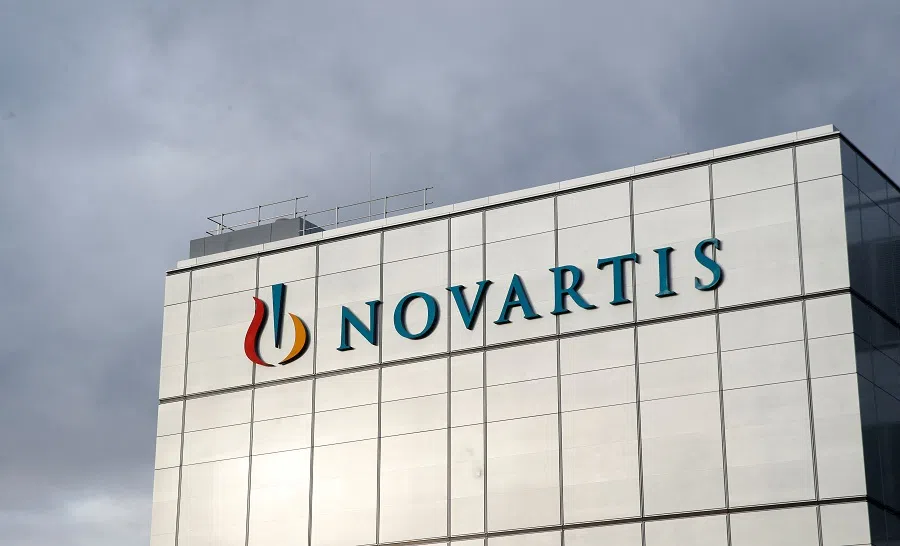
The following week, Swiss pharmaceutical giant Novartis Pharma AG and a subsidiary of BeiGene jointly ended an agreement they signed nearly two years ago, with the former relinquishing its exclusive license to the Chinese company's TIGIT inhibitor ociperlimab, a type of tumour immunotherapy, according to an announcement by BeiGene.
At the end of 2021, Novartis paid BeiGene a down payment of US$300 million for the treatment, part of an agreement that included subsequent milestone payments of more than US$2.5 billion and a share of sales. Milestone payments are made when a project reaches a pre-determined stage of development, such as the beginning of clinical trials.
According to the plan, the two companies would jointly develop, produce and commercialise its TIGIT inhibitor in North America, Europe and Japan. By the end of 2022, more than 1,600 patients had been enrolled in the development programme, while eight global clinical trials were carried out in patients with various types of cancer.
However, a number of clinical studies using TIGIT inhibitors, including by global pharmaceutical giants Roche Holding AG and Merck & Co. Inc. failed, and Bristol-Myers Squibb Co. stopped its TIGIT project.
In most cases, the companies involved didn't publicise clear reasons, leading to questions about whether the termination was related to problems with the products themselves.
Multiple pharmaceutical industry insiders told Caixin that it is not surprising that Novartis chose to terminate the cooperation with BeiGene on its TIGIT inhibitor when major peers encountered obstacles in their research and development (R&D) of the same type of treatment.

According to public information compiled by Caixin, at least ten cases of terminated collaborations have been accompanied by similar restitution of overseas rights since 2018.
In most cases, the companies involved didn't publicise clear reasons, leading to questions about whether the termination was related to problems with the products themselves.
Industry insiders cited internal adjustments, low market sentiment and concerns about the high risk of new drug development as possible reasons.
In the case of BeiGene, for example, one reason the collaboration with Novartis was ended could be the latter's strategic restructuring in recent years to focus its resources on its strengths, which has led to the abandonment of several projects, said Leon Tang, founding partner of consultancy InScienceWeTrust BioAdvisory. Novartis is currently plagued by patent cliffs, and a large number of best-selling varieties in the pipeline are facing patent expiration, so remedial measures must be found quickly, he said.
Another reason could be the market's reduced confidence in the commercial prospects of TIGIT inhibitors, Tang said.
... smaller startups will be hardest hit as they usually have only one or two core projects and will find it difficult to regain confidence in the market after experiencing a return...
The increased number of cases of suspended collaborations may also be linked to slower growth in the biotech industry in the US, where successive interest rate rises over the past 18 months have weakened firms' ability to raise funds in the capital markets, causing some companies to forgo spending on R&D of new drugs, according to Tang. "Almost all [US] tech companies have made related adjustments."
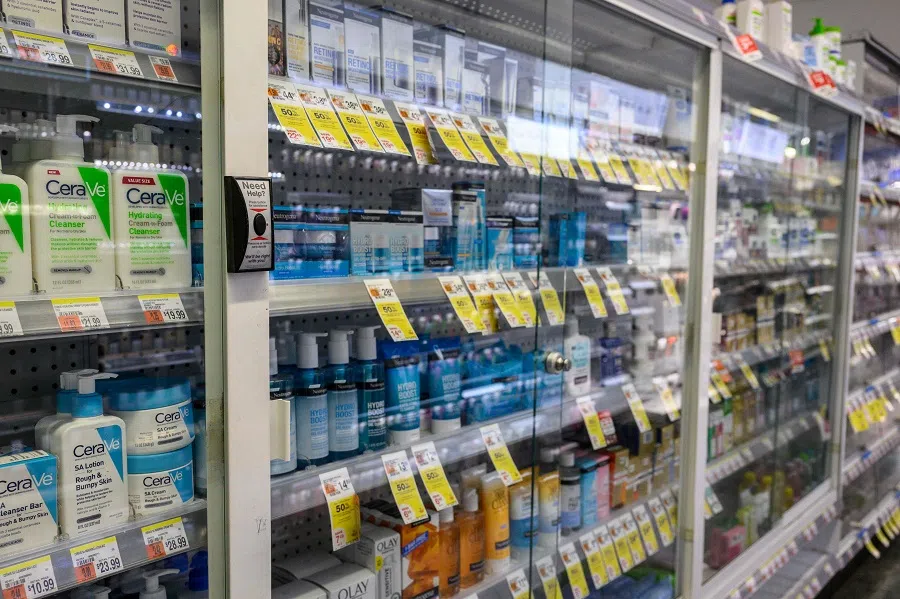
A staff member at a listed Chinese drug company responsible for business development agreed, saying that such strategic adjustments are not limited to Chinese drug companies' projects.
Many pharmaceutical firms seeking to go overseas "are not as popular with the market as they used to be and returning (rights to their products) may become the norm," said a private equity fund manager.
Hardest hit
While there will be little impact on big companies that still have a high international profile, such as Beigene, smaller startups will be hardest hit as they usually have only one or two core projects and will find it difficult to regain confidence in the market after experiencing a return, a private equity source told Caixin.
Companies that have out-licensing agreements with smaller overseas firms are more likely to experience product rights returns, as the latter are more concerned about uncertainty in new drug development, Liu said.
Still, Zhang Fuyao, chairman of Shanghai Bestlink Biotechnology Co. Ltd., believes the overall impact will be limited, and he suggests domestic biotech startups consider what multinationals have and what they want.
The US Food and Drug Administration (FDA) has emphasised that patient needs and clinical trial results are key in deciding whether to approve a drug, according to a meeting in 2022, where an FDA advisory committee reviewed an application for market entry for a lung cancer drug co-developed by Innovent Biologics and the US's pharmaceutical giant Eli Lilly & Co.
The FDA ultimately did not give the drug a green light, and Eli Lilly subsequently announced in December that it had terminated its deal with Innovent Biologics and given up its overseas rights to the drug.
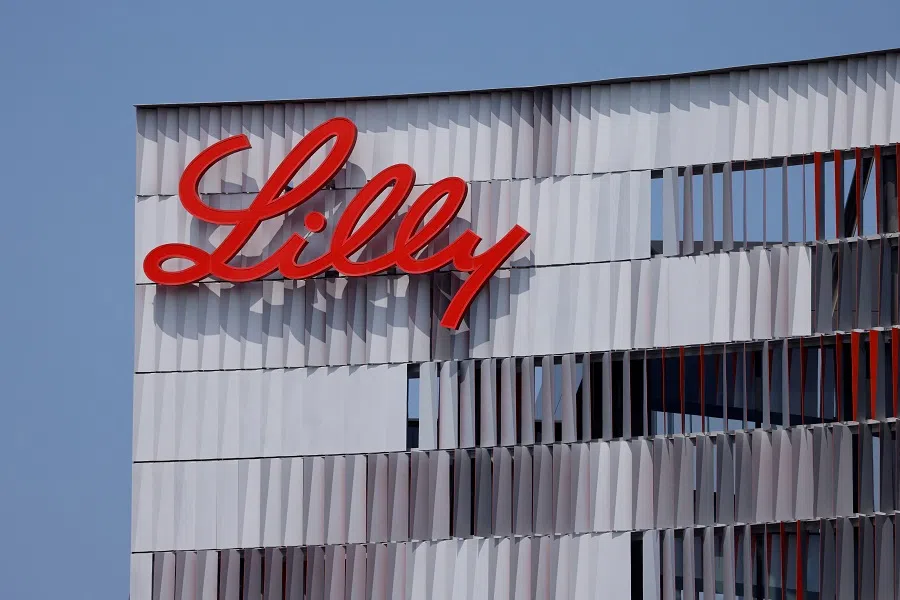
This highlights the need to improve the overall quality of drug innovation in China, including ample, reliable data, to help local developers' products reach overseas markets, industry insiders said.
Zhang Dan, co-founder of global clinical trial services provider ClinChoice, pointed out that large multinational drug companies are strong in registration and global sales, which is the most valued advantage for Chinese innovative drug companies seeking to go overseas. "But to rely on such big pharmaceutical companies, you first need to have very good clinical trial data," Zhang said.
... in a cooling market, Chinese drug innovators are more likely to raise capital from multinational companies than traditional investment institutions, but the prerequisite for success is that their products have solid data. - Leon Tang, InScienceWeTrust BioAdvisory Founding Partner
This view was echoed by Tang, who said that in a cooling market, Chinese drug innovators are more likely to raise capital from multinational companies than traditional investment institutions, but the prerequisite for success is that their products have solid data.
Several industry insiders told Caixin that following last year's decline in investment in Europe and China, big pharmaceutical companies in the US are now flush with cash, and they plan to acquire products they consider valuable and promising at low prices.
Tang believes that some of those purchases will happen in China. "Even if the overall level of innovative drug R&D in China is a bit worse, with such a large R&D scale, quality projects are bound to emerge."
China had more than 5,000 pipelines of drug candidates in development as of January, according to this year's Pharma R&D Annual Review published by consultancy Citeline.
Wang Yinxiang, chairman and CEO of Jacobio, said at a media event that signing out-licensing agreements with large multinationals will remain the main way for Chinese startups to enter overseas markets for a relatively long time, as it is "extremely difficult" for them to go global on their own.
This article was first published by Caixin Global as "In Depth: Canceled Contracts Upset Chinese Drugmakers' Overseas Push". Caixin Global is one of the most respected sources for macroeconomic, financial and business news and information about China.



![[Video] George Yeo: America’s deep pain — and why China won’t colonise](https://cassette.sphdigital.com.sg/image/thinkchina/15083e45d96c12390bdea6af2daf19fd9fcd875aa44a0f92796f34e3dad561cc)
![[Big read] When the Arctic opens, what happens to Singapore?](https://cassette.sphdigital.com.sg/image/thinkchina/da65edebca34645c711c55e83e9877109b3c53847ebb1305573974651df1d13a)
